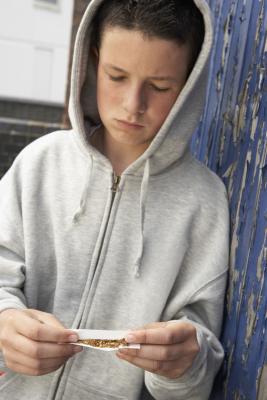Marijuana remains the most commonly used illegal drug among America’s youth, according to the Centers for Disease Control and Prevention. Reports show that while illicit drug use has declined among teens in the United States, the nonmedical use of prescription drugs abused by teens remains high. These include prescription medications, such as stimulants, pain relievers and tranquilizers. Teens also misuse over-the-counter drugs, including cough and cold medications.
Signs of Drug Use
Certain changes in behavior may indicate that your teen has a substance abuse problem. Although the teen years present special challenges and stresses, a hostile attitude, extreme anxiety, depression or constant sleepiness may be signs of drug use. While it’s common for teenagers to be moody at times, violent mood swings could be a symptom of an undiagnosed physical or psychological disorder. Some teens suffering from a mood disorder use drugs to self-medicate. A sudden decline in school grades, poor attendance at school, dropping out of his normal extracurricular activities and no longer hanging out with his usual friends are other changes in a teen’s behavior that can signal a problem.
Intervention
If you suspect your teen is using drugs or drinking alcohol, you need to act immediately. Even if your teen is just experimenting and drug or alcohol use starts out as casual, it can lead to dependency, substance abuse and addiction. Start by talking to your child in a calm and supportive manner. Getting visibly upset may only escalate an already bad situation. Try to keep your teen from getting on the defensive, but approach the issue directly. Observe your teen’s behavior and monitor her activities. Get professional help and support for both your teen and your family if the situation seems to be out of your control.
Need for Treatment
Treatment is the logical step for helping your teen. Learn as much as you can about substance abuse and its treatment. Take your child to a mental health professional for a comprehensive assessment and screening. An evaluation by professionals can help you select the treatment program that is right for your child as your teen may have physical, emotional, psychological or social issues that need to be addressed as well.
Types of Treatment
Drug rehab services and programs for teens include outpatient and residential treatment clinics. Wilderness programs and recovery summer camps are other options available for troubled teens. The level of treatment depends on how long a teen has had a substance abuse problem, if a teen has medical problems caused by the drug abuse and whether a teen has other psychological, emotional or social problems. Treatment may involve detox, behavior modification or individual, group and family therapy. A residential program can be quite expensive, but it may be necessary when other programs have failed to help a teen recover from drug use.
Support Network
Talk to friends, family members, medical professionals and the parents of other teens who have substance abuse problems. As a parent, you need to maintain a strong network of support while your child is recovering. It may help you to know that you are not alone; millions of other families are dealing with the same problem. The key is to realize is that your child’s problem is treatable.
Recovery
Recovering from a drug and/or alcohol abuse problem can take time, and relapses can occur. Recovery from substance abuse presents challenges to both the teen and his family. It isn’t always easy to cope. Family members may no longer trust the teen, or they may feel guilty about not trusting him. Every family deals with the situation differently. However, even if relapse occurs, it’s important for a teen and his family members to identify what triggered the relapse so that similar situations can be avoided in the future.





